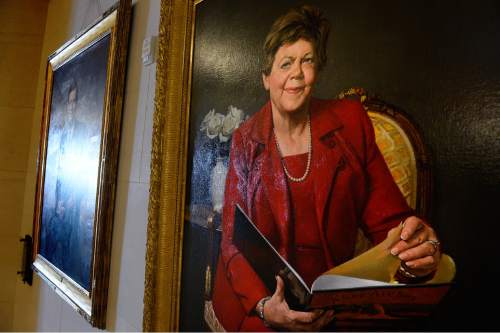This is an archived article that was published on sltrib.com in 2015, and information in the article may be outdated. It is provided only for personal research purposes and may not be reprinted.
Olene Walker was such an optimist, about life in general and politics in particular, that she would probably not want anyone to use her passing as an excuse to criticize her beloved state of Utah for its patriarchal culture, its anti-democratic political nominating system or its unwillingness to do the best for children and the downtrodden.
So we won't.
Walker, who died Saturday at the age of 85, served in the Utah House for eight years and as the state's lieutenant governor for 10. And, for a brief but eventful 14 months, she was Utah's first and, so far, only female governor.
She came to that office in 2003 upon the resignation of Gov. Mike Leavitt, who left to become director of the Environmental Protection Agency under President George W. Bush.
Leavitt was confident that he had left the state in capable hands. But Walker's hopes of being elected in her own right ended in 2004, when the Republican Party's convention delegates ignored her soaring public approval ratings and sent her into an involuntary retirement from elective office.
But not from public life. Or from working for the public good.
A lifelong advocate of public education, Walker continued to crusade for that cause, as well as for efforts to get more women to seek and serve in elective office.
Her devotion to education expressed itself in many forms, from reading Dr. Seuss to young children to earning a Ph.D. in educational administration at the age of 55. And it was evident in her brief governorship, as she effectively wielded her veto pen, threatening to block a year's budget if lawmakers didn't add money to an early childhood reading program and actually torpedoing an attempt to funnel public money into private education.
That veto may have been the end of Walker's career in elective office, enraging the far right wing of her Republican Party which, then and now, controls the nominating process. But she never looked back.
As others now look back at Walker's life and career, they recall a woman who was devoted to her family, her state and its children. Who always had time to listen. Who was interested in the common good above personal gain. Who won friends and disarmed opponents with an often self-depreciating sense of humor.
Who was not above taking advantage of a public persona that sometimes seemed to be that of a somewhat distracted grandmotherly sort, until it was just the right political moment to pounce. Or cut a deal.
Walker's legacy includes the Olene S. Walker Institute of Politics and Public Service at Weber State University. The institute seeks to encourage more people to participate in public life, to, in Walker's own words, combine her two great passions: education and politics.
As Olene Walker played it, politics was an honorable endeavor, something that was not beyond, or beneath, a farm girl, mother of seven, businesswoman and educator.
We are unlikely to see anyone quite like her again. But we will all benefit greatly if others are inspired to follow her example.



